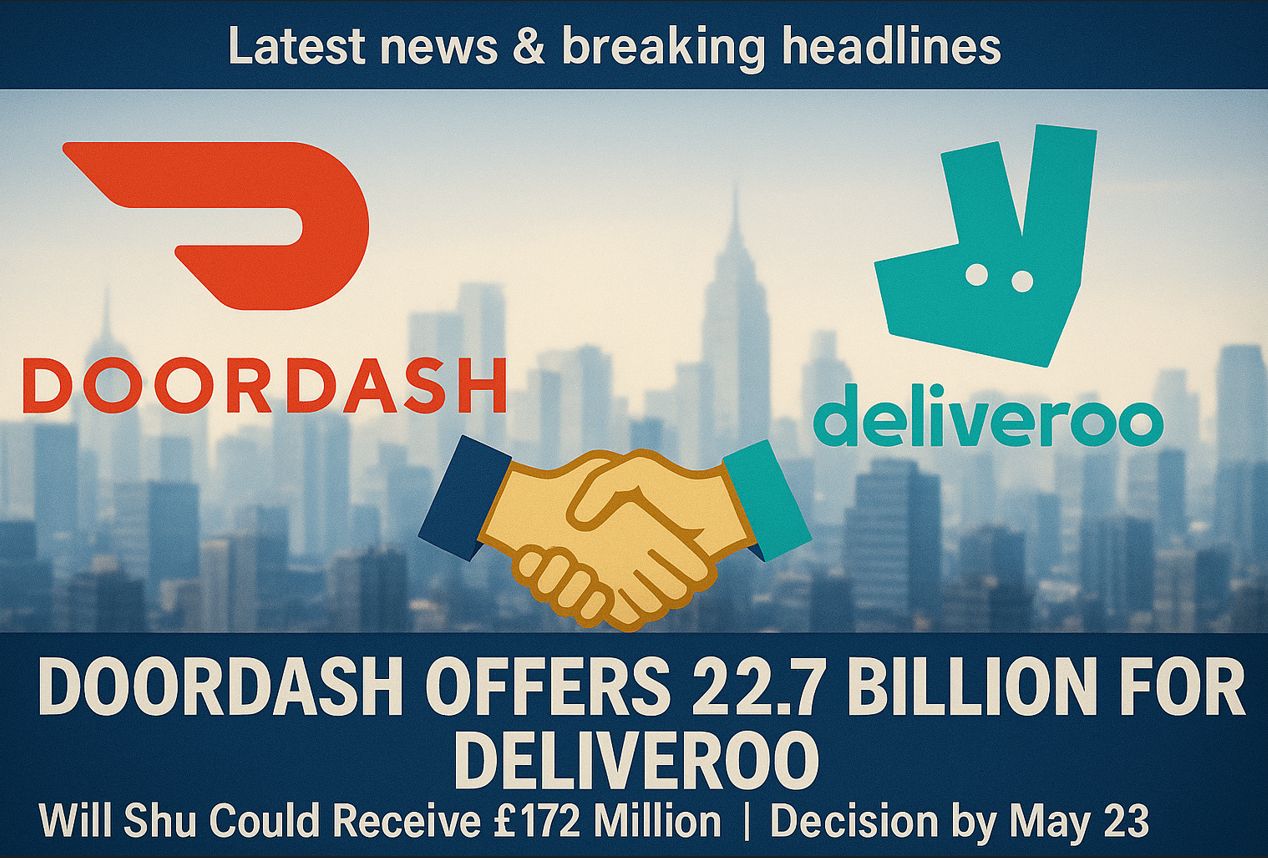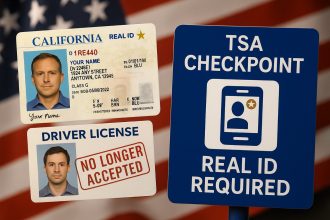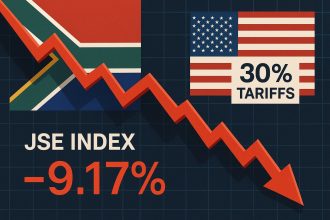Picture this: it’s a rainy Friday night, and you’re craving your favorite Thai curry. With a few taps on your phone, Deliveroo has it at your door in under 30 minutes. That convenience, which I’ve relied on more times than I’d like to admit, is at the heart of a massive business deal shaking up the food delivery world. US giant DoorDash has made a £2.7 billion ($3.6 billion) offer to buy UK-based Deliveroo, a move that could reshape how we get our meals delivered. As a journalist who’s spent a decade digging into stories like this, I’m here to break down what’s happening, why it matters, and what it means for everyone involved—from customers like you and me to the riders zipping through city streets.
The Deal: What We Know So Far
On April 5, 2025, DoorDash proposed buying all of Deliveroo’s shares for £1.80 each, valuing the company at £2.7 billion, according to Reuters. Deliveroo’s board has indicated it’s “minded to recommend” the offer to shareholders if DoorDash makes a firm bid by May 23, 2025. This isn’t a done deal—DoorDash is still conducting due diligence, and there’s no guarantee the offer will become final. But the fact that both sides are talking seriously has the industry buzzing.
This isn’t the first time DoorDash has eyed Deliveroo. Last summer, rumors of a takeover surfaced, but talks collapsed over disagreements on valuation, as noted by The Guardian. Now, with a formal proposal on the table, the stakes are higher, and the clock is ticking.
Meet the Players: DoorDash and Deliveroo
Let’s get to know the companies behind this potential mega-deal.
DoorDash: The US Powerhouse
Founded in 2012, DoorDash is the largest food delivery app in the United States, serving 42 million monthly active users and generating $10.7 billion in revenue in 2024, per The Guardian. Based in San Francisco, it’s expanded to over 25 countries, including Canada, Australia, and Japan. DoorDash isn’t just about restaurant deliveries anymore—it’s ventured into groceries and retail, aiming to be a one-stop shop for on-demand services. Its 2021 acquisition of Finnish rival Wolt for $8.1 billion shows it’s no stranger to big international deals.
Deliveroo: The UK Favorite
Deliveroo, founded in 2013 by Will Shu, is a London-based company that’s become a staple for UK foodies. It’s the second-largest food delivery app in the UK, with 7.1 million average active users and £2.07 billion in revenue in 2024. Like DoorDash, it’s branched out into grocery and retail deliveries, launching Deliveroo Shopping for items like electronics and toys. However, since its 2021 IPO, which valued the company at £7.6 billion, its stock has dropped nearly 50%, earning it the unfortunate nickname “Flopperoo” among some traders, as reported by The Telegraph.
Why Is This Happening Now?
DoorDash’s Global Ambition
DoorDash is on a mission to dominate the global food delivery market. While it’s a leader in the US, its international presence is still growing. Acquiring Deliveroo would give DoorDash access to 10 new markets, including the UK, Ireland, France, Italy, Australia, and the UAE, creating what analysts call a “highly complementary footprint,” according to Reuters. This move aligns with DoorDash’s strategy of snapping up smaller players to expand, as seen with its Wolt acquisition.
Deliveroo’s Rocky Road
Deliveroo, meanwhile, has faced challenges since its IPO. The post-pandemic slowdown in online food delivery, coupled with fierce competition from Uber Eats and Just Eat Takeaway.com, has taken a toll. The company only recently reported its first annual profit of £2.9 million in 2024, a milestone after years of losses, per Forbes. A deal with DoorDash could offer financial stability, access to advanced technology, and a chance to compete more effectively.
The Financial Angle
The £2.7 billion offer is a significant discount from Deliveroo’s £7.6 billion IPO valuation, reflecting its struggles. For Will Shu, the deal could be personally lucrative—he stands to earn over £170 million based on his current holdings, as reported by The Telegraph. Amazon, Deliveroo’s largest shareholder with a 14% stake, could pocket £387 million.
The deal is expected to face minimal regulatory scrutiny, as it would give DoorDash access to markets where it currently has no presence, avoiding antitrust issues that competitors might face, according to Reuters. JPMorgan is advising DoorDash, signaling the deal’s seriousness.
| Stakeholder | Potential Benefits | Potential Risks |
|---|---|---|
| DoorDash | Access to 10 new markets, cost synergies | Integration challenges, financial strain |
| Deliveroo | Financial stability, access to DoorDash’s tech | Loss of independence, potential job cuts |
| Customers | Improved service, more options | Higher prices, reduced competition |
| Riders | Potential for better tech and support | Changes in pay or working conditions |
| Restaurants | Larger customer base | Less negotiating power with fewer platforms |
The Human Side: What About Us?
As someone who’s ordered countless meals through Deliveroo, I can’t help but feel a mix of excitement and apprehension. My first Deliveroo order—a perfectly spicy pad Thai delivered in record time—felt like a small miracle. Will that magic survive under DoorDash’s ownership? Mergers often bring growing pains, and I worry about longer wait times or higher fees.
Then there’s the human element. Riders are the backbone of this industry, braving rain and traffic to deliver our meals. DoorDash has faced criticism for its treatment of drivers in the past, including a 2017 class-action lawsuit over misclassifying drivers as independent contractors, which led to a $100 million settlement, per Wikipedia. I hope this acquisition prioritizes fair treatment for riders, who deserve better than being caught in the crossfire of corporate deals.
Restaurants, too, are watching closely. A combined platform could mean more customers, but with fewer delivery apps to choose from, they might face tougher terms. It’s a delicate balance, and the industry’s future hinges on getting it right.
A Quick Aside: Exploring New Opportunities
Speaking of big moves, have you heard about PocketOption? It’s a trading platform that’s been making waves in the financial world. A colleague recently started using it and couldn’t stop raving about its intuitive interface and the range of assets you can trade, from stocks to cryptocurrencies. If you’re curious about diving into trading or just want to explore new financial tools, it might be worth a look. Now, back to our food delivery saga.
What Could Go Wrong?
While the deal looks promising, there are risks. Integration challenges could lead to service disruptions, and cultural differences between the US-based DoorDash and UK-based Deliveroo might complicate things. There’s also the question of competition. A more consolidated market could mean less innovation, though DoorDash has promised to keep Deliveroo’s brand and operations intact for now, per Bloomberg.
Public perception is another factor. Deliveroo’s “Flopperoo” IPO left some investors wary, and DoorDash’s driver controversies haven’t faded from memory. Both companies will need to manage their reputations carefully to win over customers and stakeholders.
Looking Ahead
The potential acquisition of Deliveroo by DoorDash is a pivotal moment for the food delivery industry. If it goes through, DoorDash could emerge as a global leader, while Deliveroo might find the stability it’s been seeking. For customers, riders, and restaurants, the outcome will depend on how the companies navigate the transition.
As we await DoorDash’s firm offer by May 23, one thing is clear: the food delivery world is evolving, and fast. Whether you’re a loyal Deliveroo user or a DoorDash devotee, this deal could change the way you get your next meal. So, the next time you order that late-night pizza, take a moment to appreciate the complex web of business, tech, and human effort behind it—and stay tuned for what’s next.





